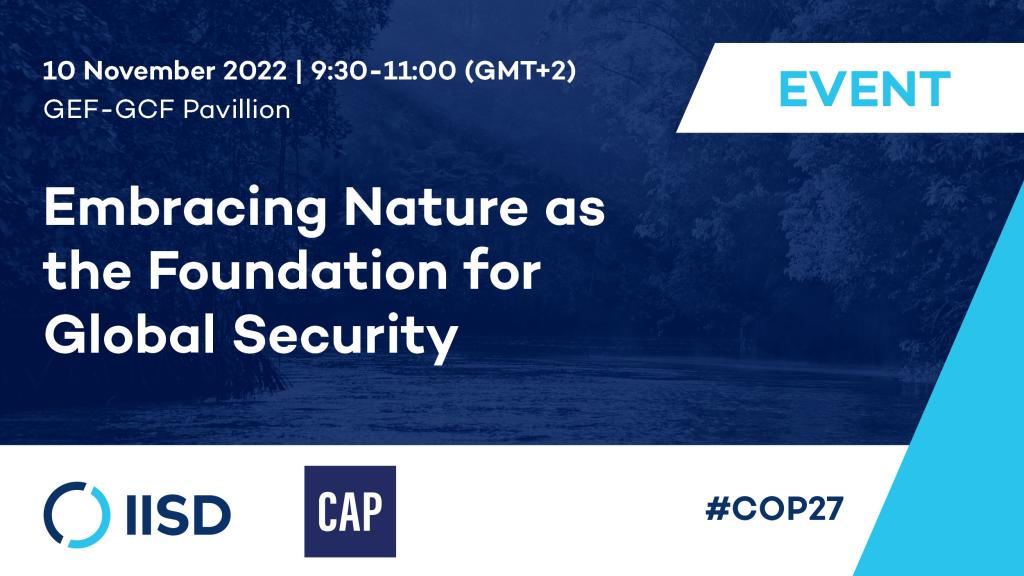COP 27 Event | Embracing Nature as the Foundation for Global Security

About
Date: 10 November 2022
Time: 9:30-11:00 am (GMT+2)
Location: GEF-GCF Pavillion (Blue Zone).
The event will be livestreamed by the GEF here: www.gcfgefcop.org
This event will elevate the security risks that are directly and indirectly linked to nature loss, environmental change, and ecological degradation. The moderator and panelists will discuss the importance of nature as the foundation for human, national, and global security, as well as how the nature-security nexus can and should be used to provide a more holistic understanding of the pathways from environmental degradation to security outcomes to better protect people in the places where they live.
Background
As the world confronts climate change and ecosystem degradation, it is becoming increasingly clear that the cumulative impacts of both crises threaten the security of people and countries around the world. Most immediately, these crises are causing individuals, households, and communities to struggle to meet their basic needs while maintaining their health, livelihoods, and economic security. They are also exacerbating tensions around migration and resource access, challenging political stability and contributing to conflict.
Mitigating these climate- and nature-related threats to human, national, and global security will require a multi-faceted approach, including the reduction of global greenhouse gas emissions and economy-wide transition away from fossil fuels; increased investments in climate resilience and adaptation; and a reversal in the destruction and degradation of ecosystems.
COP 26, held in Glasgow in November 2021, featured a strong focus on the intersections of climate and nature. Based on the Leaders Pledge for Nature and the G7 Nature Compact, the U.K. Presidency of COP 26 shaped the summit around a “Nature Campaign” theme that strongly advocated for increased ecosystem and biodiversity conservation. The theme also highlighted nature’s contributions to and synergies with climate action and sustainable development. The Glasgow Climate Pact recognizes the interlinked global crises of climate change and biodiversity loss and the critical need to protect, conserve, and restore nature and ecosystems. Several pledges, such as the Glasgow Declaration on Forests and Land Use, also underpin the strong commitment by countries to sustainable land use, production, and consumption.
COP 27 stands to build upon this progress, with its focus on developing greater resilience and reducing vulnerability to climate change—objectives that necessitate the conservation and restoration of nature. This event aims to reinforce these connections, while establishing the ways in which nature must be embraced as the foundation for human, national, and global security—thereby reshaping decision making among traditional security actors and potentially unlocking new sources of finance.
Keynote Speaker
- Monica Medina, Assistant Secretary for Oceans and International Environmental and Scientific Affairs, U.S. Department of State
Moderator
- Richard Florizone, President & CEO, International Institute for Sustainable Development
Panelists
- Alice Ruhweza, Africa Region Director, Worldwide Fund for Nature
- Natalie Unterstell, President, Talanoa Institute
- Chiz Aoki, Lead Environmental Specialist, GEF Programming Unit
